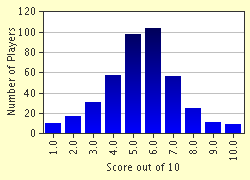Quiz Answer Key and Fun Facts
1. Ludwig van Beethoven was born in what city in which year?
2. Beethoven first appeared as a performer at what age?
3. Beethoven's Symphony No. 3 ("Sinfonia Eroica") was originally titled what?
4. In the 1802 Heiligenstadt Testament, Beethoven wrote that he wanted to die but something held him back. What was it?
5. Beethoven last performed as a pianist in what year?
6. Which symphony number is "Ode to Joy"?
7. Beethoven died on March 26 of what year?
8. Which symphony is considered Beethoven's most famous work?
9. Beethoven was a bridge between what two periods?
10. When Beethoven left for Vienna in 1792, Count Waldstein told him to "Receive the spirit of ________ from the hands of ________."
Source: Author
angelpineapple
This quiz was reviewed by FunTrivia editor
bullymom before going online.
Any errors found in FunTrivia content are routinely corrected through our feedback system.


